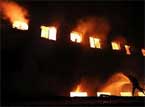| |
|
| |
|
 |
Supply
Chain by the Numbers |
| |
|
| |
- Sept. 20, 2013
|
| |
|
| |
|
| |
|
| |
Mondelez Battling Massive SKU Bloat; UN Climate Report Dialing Back Warming Predictions - Maybe; Odd Compensation Deal for Bangladesh Apparel Victims; DRAM Factory Fire Shows More Supply Chain Risk |
| |
|
| |
| |
| |

|
$77 Million |
The estimated total payout to the families of workers killed in two apparel factory disasters in Bangladesh, one a fire that killed more than 100 workers in late 2012 and then a building collapse earlier this year that killed more than 1100. The whole process is unusual if not strange for several reasons, among them the fact that the Western brand and retail companies that are in negotiations for the compensation did not own the factories where the tragedies occurred. Additionally, just a subset of Western firms using contractors operating in the facilities are participating in the compensation programs, some saying they fear additional lawsuits if they join the negotiations. Those include Walmart and Benetton. That reasonably large sounding total payment number will actually only provide some $33,000 per family of the deceased victims, however.
|
| |
| |
|
| |
| |
| |
16% |
|
Substantial level of the world's dynamic random access memory (DRAM) chips, used to store data in personal computers and mobile devices such as smartphones and tablets, produced by a single factory in China - a plant that sustained substantial fire damage on Sept. 4. A spokesman for South Korea's SK Hynix, which owns the factory, said last week that although some production was back up within three days of the blaze, "It's still too early to give the estimate of the damage and to predict when full operations may resume." And that may be delivering supply chain disruptions to many high tech and consumer electronics gear makers, though existing inventory levels in the pipeline are said to be high.
"Hynix is in a relatively advanced position in the global memory chip market, so even a single incident at one plant will have a domino effect," said Wang Jun, of research firm Analysys International.
|
| |
| |
| |
|
|
|
| |
 |
 |
| |
|
|
| |